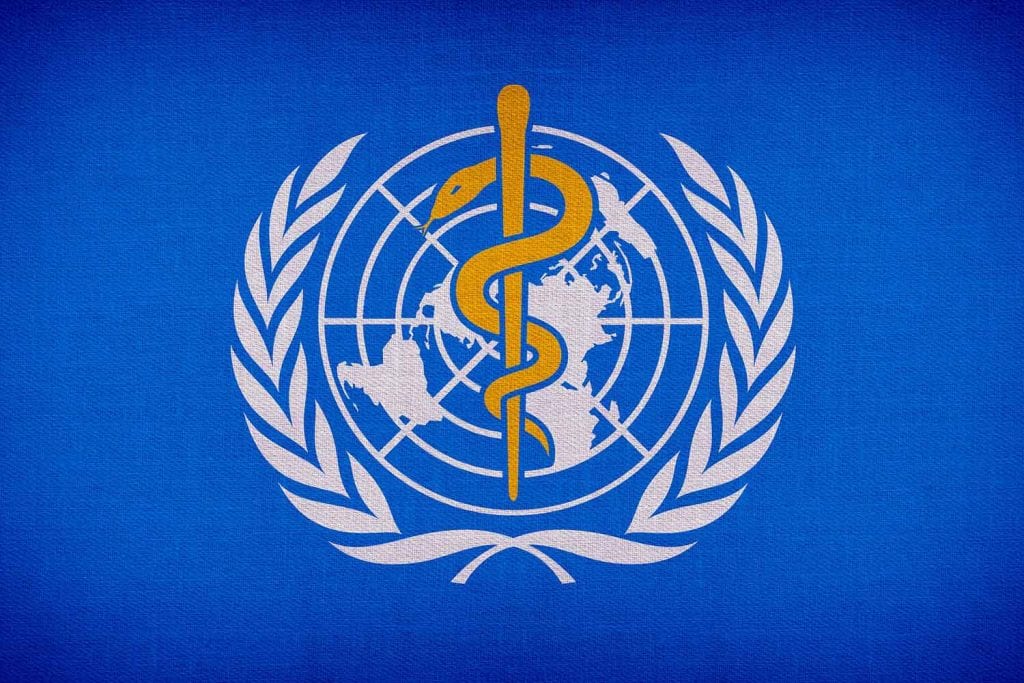
Now would be a good time for the World Health Organization to change direction without abdicating from its tobacco responsibility.
By George Gay
A few lines from a song by the late Warren Zevon have taken up residence in my head of late: “You can dream the American Dream / But you sleep with the lights on / And wake up with a scream.” Whether or not they buy into the idea of the American Dream, a lot of people around the world, I imagine, are feeling that level of fear because of the Covid-19 pandemic. Take me, for instance: I have been waking with a scream brought on by a recurring dream in which, with the world in the grip of a post-Covid-19 pandemic, I am trying to discover whether the U.K. government has managed finally to get its head and technology around the concept of contact tracing. The answer is no.
But it’s not all bad news, I’m told. The government is now able to inform me of the whereabouts of every pack of cigarettes in existence, nationally or internationally. There is even some talk about how it might have been able to game Heisenberg’s uncertainty principle since, by using a track-and-trace system developed at the behest of the World Health Organization (WHO) that works in real time, even during deliveries, it is aware of both the position and momentum of each pack. It is at this point that I wake up screaming.
Why has building a track-and-trace system for cigarette packs apparently been seen as more important and more urgent than developing a globally adaptable, fast-to-implement and efficient contact tracing system for people during times of pandemics? I don’t know, but I can guess at a number of reasons, one of which was playing out across the world as I wrote this piece in June when many of those in authority were demonstrating once again the relative importance they attach to the preservation of people (low) and property (high).
In addition, as far as I can see, the cigarette pack track-and-trace system is in place to ensure that those who choose to smoke and thereby risk their health pay the full price for their cigarettes. The “free” market, which the WHO clearly supports, demands that a proper level of profit and tax revenue should be squeezed out of the products that make people sick and that a proper level of profit should be made in treating that sickness.
Dismantling the arguments
But whereas it’s easy to see why some businesses dealing in tobacco and health would appreciate what they would see as the benefits of such a system, I struggle to understand why the WHO would find it advantageous. So let me take a guess about what we might be told if the WHO were, with the help of a nosegay, able to bring itself to answer questions from a representative of the tobacco industry. Firstly, though, it is necessary to understand that the WHO believes that the implementation of its track-and-trace system will reduce—it actually uses the word “eliminate,” but that is the stuff of dreams—the sale of illicit cigarettes and therefore smoking. Given this, I imagine it would say the consumption of tobacco causes the deaths of 8 million people a year whereas Covid-19 has so far (see below) caused the deaths of 430,241, so tobacco is by far the bigger threat.
There are a number of problems with this argument. The main one as I see things is that whereas tobacco has been around for a long time and therefore has to be subjected to control measures, there is still time to build robust preventative measures to combat the thousands of potential viruses that are lining up to devastate lives and economies around the world. And in the eyes of all but the most virulent free market supporters, prevention must be preferred to control, so a people contact tracing system should be regarded as being way more urgent than a cigarette pack track-and-trace system.
Another problem with the above argument is that it is based on two figures that are clearly wrong: one being ludicrously rounded, the other being ludicrously precise, even though they are both WHO figures published this year. The 8 million figure was published on May 26 without even the qualification of an “about” while the 430,241 figure was published in respect of the period of the Covid-19 crisis up to June 15.
Does it matter that these figures are wrong? To my mind, yes. It’s a matter of trust. We seem to have reached a situation whereby any information dumped on the unsuspecting public, no matter how distorted, can be justified on the grounds that it is meant to bring about the most advantageous result, seemingly defined as the result best suited to the ideologies of those putting that information out. And once people and organizations start to believe in this way of carrying on, especially as in the case of the WHO, if they refuse to engage with those of the outer dark, they become reckless. For instance, in recent times, the WHO’s annual tobacco-related deaths figure seems to have been playing 1 million unit leapfrog with its pollution-related deaths figure.
But it is not only the hyperinflation of these figures that make them look suspect. Given that many people who die of tobacco-related or pollution-related deaths will die from, say, lung disease, how is it possible to accurately ascribe these deaths to their rightful causes? If a smoker living in a flat adjacent to a city’s main diesel bus parking and servicing depot dies, is her death put down to pollution or to smoking? No prizes for correctly guessing the answer.
The end result of all this will surely be that no thinking person will trust such figures and, by extension, the individuals and organizations that pump them out with the further consequence that various people will be wringing their hands because the person in the street has become fed up with experts. It is necessary to remember that if you publish dodgy information, as it is passed down the line it will become further distorted until the point where it becomes drivel.
Take the 430,241 figure. In a story in my newspaper, the writer or editor, presumably concerned that it was not possible to justify such an exact figure, rendered it as “more than 430,000,” which sidesteps one problem but runs into another. What does “more than” mean here: 430,001, 4.3 million, 4.3 billion?
Meanwhile, a recent note by the British Heart Foundation (BHF), which claimed that “contrary to headlines suggesting that nicotine protects against Covid-19, smokers are more likely [presumably than nonsmokers] to contract the coronavirus.” It makes this claim, even though it quotes a WHO note that says, in part, “There are currently no peer-reviewed studies that have evaluated the risk of SARS-CoV-2 [the virus that causes Covid-19] infection among smokers.”
But not content with this nonsense, the BHF goes on to say, “Even if smoking did have a small protective effect against Covid-19, this would still be hugely outweighed by the well-known harm that smoking causes.” How can this be justified either at a personal or a smoker-population level, especially when no timeframe is mentioned? To make any such claim, you would firstly have to know what is the level of this so-called “small” protective effect, and this is not known. Then, on an individual level, you would need to know a good deal about the smoker’s personal details, including such things as her age and general state of health. And, as time goes by and we learn more about this novel virus and the disease itself, we would probably need to know more. After all, from my reading of some of the latest findings, the unprecedented damage done to the lungs and other organs while Covid-19 is active in the body far outweighs the damage done by smoking over a similar period.
The point is, we don’t know enough about Covid-19 to be handing out anything but the most basic advice about such things as hand washing and social distancing. And if we don’t know, we should say we don’t know. We should not be extolling the efficacy, nor the dangers, of nicotine in the fight against the virus unless we are fairly certain that we are right.
Wanted: New direction
And, to give it its due, the WHO took a more balanced view than the BHF in this regard. In fact, despite the above, I’m very much in favor of having a health organization with global reach, but the WHO desperately needs to change the direction set by the previous director general. It has to change its focus from addressing those health issues that individuals can tackle on their own and that are far from existential in nature, such as tobacco and nicotine use, to addressing—and here I mean preventing in preference to controlling—those health issues that the person in the street has no or little control over and that could be existential in nature, such as species-jumping viruses.
Given the state of unpreparedness that the world found itself in when the Covid-19 virus started crossing borders, it is simply ridiculous that the WHO has held eight international conferences under the auspices of its Framework Convention on Tobacco Control, including more recently its meetings of the Parties to the Protocol to Eliminate Illicit Trade in Tobacco Products. It takes 40 years or so to die from a smoking-related cause—40 years during which the smoker provides an inordinate amount of revenue to the exchequer and, yes, derives pleasure and, perhaps, solace from her habit. It takes three weeks to die of a Covid-19-related disease, and just the threat of the disease causes economic mayhem.
The good news is that now is an ideal time for the WHO to change direction without abdicating from its tobacco responsibility. Businesses have been and are providing a string of innovative products that can help cigarette smokers switch to these much reduced-risk products, including vapor devices, snus, nicotine pouches and alternative nicotine-delivery devices. The WHO doesn’t have to endorse these products; however, it does need to stop pretending that they are not highly useful products in the fight against smoking—certainly more useful than the sorts of pharmaceutical products that it seems willing to endorse.
But it’s going to be a hard job turning the WHO tanker around. To coincide with World No Tobacco Day 2020 at the end of May, an international group of independent experts with no conflicting links to the tobacco or vapor industries sharply criticized the WHO for its backward-looking approach to innovation and new technology, such as vapor products. A press note, put out under the Iowa Department of Justice’s Office of the Attorney General, made the point that these experts had become exasperated by the WHO’s dogmatic hostility toward new technology and feared the U.N. health agency would squander the opportunity to avoid millions of premature deaths that will be caused by smoking.
The attorney general, Thomas J. Miller, the longest-serving state attorney general in U.S. history, who played a leading role in the 1998 Master Settlement Agreement, claimed the WHO had lost its sense of mission and purpose. “It’s as if the WHO has forgotten what it is there to do—to save lives and reduce disease,” he was quoted as saying. “We can do that by helping and encouraging consumers to switch from cigarettes to lower risk products. This means being honest about the much lower risks and by using smarter regulation to make switching more attractive.”
To my mind, honesty is vital. But it needs to be extended to other institutions—the U.S. Food and Drug Administration and the EU Commission spring to mind—and to governments. It is vital too, to keep in mind that the aim is “to save lives and reduce disease,” though I would like to once again put in a plea here that “reducing disease” should in the first instance focus on prevention and only after failure in that aim to controlling disease. It is necessary to keep banging on about prevention because it is the logic of the free market and of many of the authoritarian and would-be authoritarian regimes around the world that if we had a global health organization that managed through prevention alone to eliminate all diseases in the world, its funding would be cut to zero.




